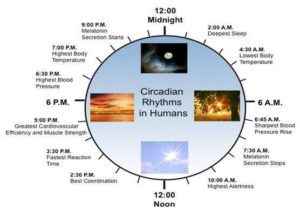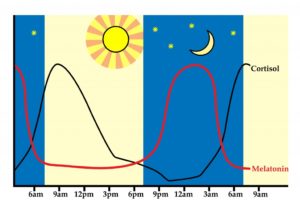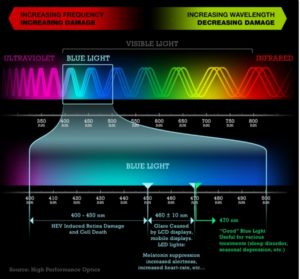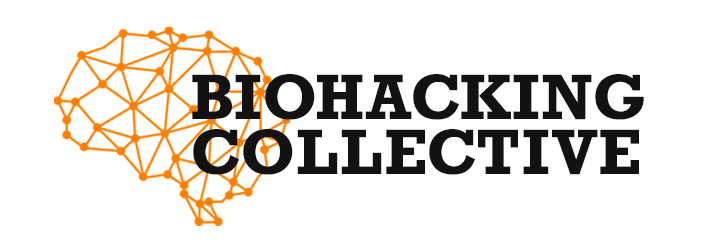We spend more and more time under unnatural light and at the same time we reduce the time we are outdoors. Unnatural light is defined in this article as light from LED illumination from screens or fluorescent lights from low energy lamps and fluorescent light tubes and focusing on the blue spectrum in the wavelength of approximately 400-500 nm.
However, overexposure to unnatural light is something that can lead to health problems, but few people are aware of this. This article aims to deduce to research focusing on these health issues and the article will also try to provide tips on how to safeguard yourself best from these light sources.
The Circadian Rhythm

In order to understand the dangers of unnatural light and the importance of the natural light as part of our built-in biological clock, the circadian rhythm must be mentioned.The Nobel Prize in Physiology or Medicine 2017 went to Jeffrey C. Hall, Michael Rosbash and Michael W. Young for their discoveries of molecular mechanisms that govern the circadian rhythm. So what does the circadian rhythm mean and how are we affected? All of our cells in the body control this 24 hour system that initiates the various biological processes at the right time. Secretion of hormones is something that follows this 24 hour cycle. In this 24 hour cycle, the sun plays an important role. The sun will change in color spectrum during the day and give our body signals of what’s going to happen.

Before we wake up, we will secret cortisol vi our adrenals to wake us up. Cortisol is often something that is associated with stress and has a slightly negative sound but cortisol is vital for giving us mental drive and energy. In the morning the sun emits a slightly redder spectrum. Red light is known to have several health benefits and helps us to gain energy and heal the body.
During the day, the light spectrum shifts towards a bluer tone that signals the alertness in our body, and then fall back into a reddish spectrum that gives us a signal that it is time for rest. The sleeping hormone melatonin is also controlled by this rhythm in the morning when our cortisol levels increase melatonin levels will decrease and in the evening, our production of melatonin is increased again.
Blue light and disturbed circadian rhythm.
Melatonin secretion begins in the evening when the body feels it’s time for rest. But what happens if the rhythm is messed up? Blue light signals alertness and it has been found in a number of studies that the blue light can change our biological clock. In case of excessive exposure of blue light and lack of natural light, our natural rhythm will be disturbed. When this rhythm is broken, melatonin production decreases and our sleep can be disturbed. Being awake longer will also increase cortisol secretion which can lead to other problems such as obesity and lower levels of testosterone and growth hormone.
Poor or disturbed sleep will short-term lead to adverse effects on mood and cognitive ability. Long-term effects of poor sleep can lead to increased risk of diabetes, cardiovascular disease and mental health problems.
Blue light and eye problems

Excessive exposure to blue light has also been shown to be harmful to the eyes. The short wavelength of the blue light is very energy-intensive for the eyes. Some studies have shown that the blue light causes damage to the retina and the macula. There are even doctors talking about a generation of macular degeneration due to excessive screen exposure. Worth adding are our children’s eyes are even more sensitive to blue light.
My solutions
• Be sure to get more natural light to restore the natural rythm. Be sure to go out when it is sunny. I usually try to catch some morning sun if possible.
• Reduce screen and TV time. Get fixed routines about how much screen time you allow yourself.
• Block blue light with glasses and screen filters. Blue blocking glasses are something I use every day especially in the afternoon. There are many apps that can help reduce the blue light from mobile phone or computer. I use F.lux on my computer and always have the mobile in night-shift mode
• Replace low energy, LED and fluorescent lamps in the home I use standard bulbs or halogen lamps .i use a bulb that blocks blue light in my bedroom.
• Use candles or red lights to balance the blue light. I use red light and infrared light daily. Lighting candles in the evening when watching TV is also a great way to balance the blue light
• Take a clean lab tested omega 3 source our eyes contains loads of DHA fatty acids.
•Use Supplements that contain Lutein and Zeaxanthin
Onaturligt ljus och dess Hälsoeffekter
Vi spenderar mer och mer tid under onaturligt ljus och samtidigt så minskar vi den tid som vi är utomhus. Onaturligt ljus definieras i denna artikel som ljus från LED belysning från skärmar eller fluorescerande ljus från lågenergilampor och lysrör med fokus på det blåa spektrumet som ligger i våglängden 380-500nm. Att överexponering av onaturligt ljus är något som kan leda till hälsoproblem är det dock få som känner till. Denna artikel har avsikten att härleda till forskning som fokuserar på dessa hälsoproblem och artikeln kommer även försöka ge tips för hur man kan skydda sig bäst från dessa ljusa källor.
Cirkadiska Rytmen
För att förstå farorna med onaturligt ljus och vikten av det naturliga ljuset som en del av vår inbyggda biologiska klocka så måste den cirkadiska rytmen nämnas. Nobelpriset i fysiologi eller medicin 2017 gick till Jeffrey C. Hall, Michael Rosbash och Michael W. Young för deras upptäckter av molekylära mekanismer som styr den cirkadiska rytmen.Så vad innebär den cirkadiska rytmen och hur påverkas vi av den? Alla våra celler i kroppen styrs av detta 24 timmars system som sätter igång de olika biologiska processerna vid rätt tidpunkt. Utsöndring av hormoner är något som följer denna 24 timmars cykel. I denna 24 timmars cykel så spelar solen en viktig roll solen kommer skifta i färgspektrum under dagen och ge vår kropp signaler om vad som skall hända. Innan vi vaknar så utsöndras kortisol för att väcka oss. Kortisol är ofta något som förknippas med stress och har en något negativ klang men kortisol är livsnödvändigt för att ge oss drivkraft och energi .På morgonen ger solen oss ett något rödare spektrum. Rött ljus är känt för att ha flera hälsofördelar och hjälper oss att få energi och hela kroppen. Under dagen skiftar ljusspektrumet mot en blåare ton som signalerar vakenhet i vår kropp för att sedan under kvällen falla tillbaka till ett rödare spektrum som ger oss signal att det är dags för vila. Sömn hormonet melatonin styrs även av denna rytm på morgonen när våra kortisol nivåer går upp så minskar melatonin nivåerna och på kvällen kommer vår produktion av melatonin öka.
Blått ljus och rubbad dygnsrytm.
Melatonin utsöndring börjar på kvällen när kroppen känner att det är dags för vila. Men vad händer om rytmen är rubbad? Blått ljus signalerar vakenhet och det har visat sig i ett flertal studier att det blåa ljuset kan ändra vår biologiska klocka. Vid överdriven exponering av blått ljus samt brist på naturligt ljus kommer vår naturliga rytm rubbas. När denna rytm rubbas minskar melatoninproduktionen och vår sömn kan bli störd. Att vara vaken längre kommer även att ge mer kortisolutsöndring vilket kan leda till andra problem som övervikt och lägre nivåer av testosteron och tillväxthormon. Dålig eller rubbad sömn kommer kortsiktigt leda till negativa effekter på humör och kognitiv förmåga. långsiktiga effekter av dålig sömn kan leda till ökad risk för diabetes, hjärt och kärlsjukdomar samt psykiska problem.
Blått ljus och ögonproblem
Överdriven exponering för blått ljus har även visats kunna vara skadligt för ögonen. Den korta våglängden på det blåa ljust är mycket energikrävande för ögonen. Vissa studier har visat att det blåljuset ger skador på näthinnan och gula fläcken. Det finns tom läkare som pratar om en generation som kommer få förstörda ögon pga. av överdriven skärmexponering. Värt att tillägga är våra barns ögon är ännu mer känsliga för blått ljus.
Mina lösningar
- Se till att få mer naturligt ljus för att återställa den naturliga rytmen. Passa på att gå ut när det är soligt. Jag brukar försöka fånga lite morgonsol om möjligt.
- Reducera skärm och TV tid. Skaffa fasta rutiner kring hur mycket skärmtid du tillåter dig själv.
- Blockera blått ljus med glasögon och skärmfilter. Blåljus glasögon är något som jag använder varje dag särskilt på eftermiddagen. Det finns många appar som kan hjälpa till att reducera det blåljuset från mobiltelefon eller dator. Jag använder F.lux på datorn och har alltid mobilen i nightshift mode
- Byt ut lågenergi, led och lysrör i hemmet.Jag använder vanliga glödlampor eller halogenlampor samt en glödlampa som blockerar blått ljus i mitt sovrum.
- Använd levande ljus eller rött ljus för att balansera ut det blåa ljuset. Jag använder rött ljus och infrarött ljus dagligen. Att tända levande ljus på kvällen när du kollar på tv är även ett bra sätt att balansera ut det blåa ljuset
- Ta en ren labbtestad omega 3 källa ögonen består till stor del av DHA
- Supplementera med tillskott som innehåller Lutein och Zeaxanthin


